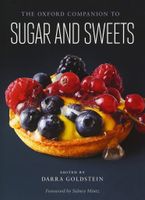Advertisement
Sweet Offerings in Everyday Life
Published 2015
Sweets thus have a complicated history in Christianity. They remain central to the meals and words with which Christians have celebrated their faith over the past two millennia. Yet they prevail not in the formal rituals of Christian churches, but in ceremonies at homes, graveyards, and neighborhoods. They accompany births, baptisms, and marriages as festive treats. See birth; funerals; and wedding. But their spiritual significance emerges mainly in funerals and ancestral commemorations in which the dead are made present again among the living. The table or grave becomes an altar, and the sweet offerings take on Eucharistic dimensions; they are often shaped like the body of the dead and may be inscribed with his or her name. Women are the cooks and main officiants, especially where church rituals remain in men’s hands. Fertility, growth, and love are among the life-and-death issues with which they are concerned, surely entwined with longing as in the biblical Song of Solomon, but this aspect of Christian sweets remains veiled.


